

Campagne Climat. Ce week-end verra fleurir les initiatives pour le climat. Changement climatique : la proposition dont aucun Etat ne veut. NAZCA. Climat : les « quatre piliers » de l’accord de Paris. Capitalisme et changement climatique. The real story behind Shell's climate change rhetoric. A man of Ben van Beurden’s power and reputation for blunt speaking is capable of silencing a ballroom packed with his boisterous peers.
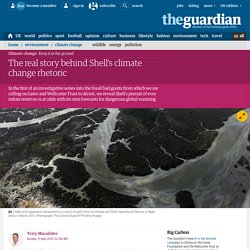
When the chief executive of Shell rose to address an industry gathering in a London hotel, a respectful hush descended. Van Beurden, 57, rose from a modest background in the Netherlands to the top of a cut-throat, politically fraught sector that rarely finds itself out of the public firing line. Shell reconnaît que le réchauffement climatique ne pourra pas se limiter à 2 degrés. Le climat change ? Désinvestissez ! La vague de chaleur en Inde fait plus de 2 000 morts. Hollande pollue la COP21 et le climat des négociations - Commentaires. State of the World 2015: Confronting Hidden Threats to Sustainability. The State of the World: A Conversation with Lawrence Freedman. L'heure du monde. Climate change is messing with gravity again. The Southern Antarctic Peninsula has dropped the ice equivalent of 350,000 Empire State buildings into the ocean since 2009, according to new research in the journal Science.
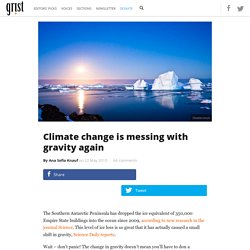
This level of ice loss is so great that it has actually caused a small shift in gravity, Science Daily reports. Wait – don’t panic! The change in gravity doesn’t mean you’ll have to don a super-cool space suit any time soon. This type of gravity-shifting ice melt was previously documented in Western Antarctica. Here’s how Eric Holthaus explained it at the time: Conférence de Paris sur le climat. Naomi Klein, le capitalisme et le climat. Entre radicalité et faisabilité immédiate. « Notre climat, pas votre business » ! Ma Jun: China has reached its environmental tipping point. It was almost 20 years ago that Ma Jun sat and watched the rainbow-coloured River Fen, in Shanxi province.
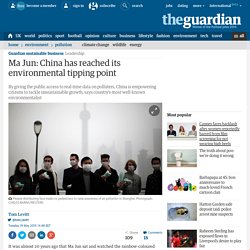
As he turned to the skies in this coal and industrial heartland of north China he could see dozens of chimneys bellowing out their fumes. He had been sent to the province on an assignment while working as a researcher for a foreign journalist in the late 1990s. The story then was about family planning and its impact on local communities, but it was the devastating pollution he witnessed that filled up his notepad.
It was these notes that would later form the basis of his first book, China’s Water Crisis, which quickly came to signify the awakening of China’s environmental consciousness – compared to Rachel Carson’s Silent Spring in terms of its impact. Fossil fuels subsidised by $10m a minute, says IMF. Fossil fuel companies are benefitting from global subsidies of $5.3tn (£3.4tn) a year, equivalent to $10m a minute every day, according to a startling new estimate by the International Monetary Fund.
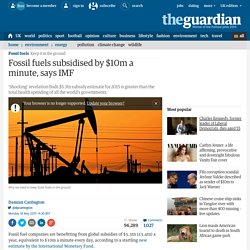
The IMF calls the revelation “shocking” and says the figure is an “extremely robust” estimate of the true cost of fossil fuels. The $5.3tn subsidy estimated for 2015 is greater than the total health spending of all the world’s governments. The vast sum is largely due to polluters not paying the costs imposed on governments by the burning of coal, oil and gas. These include the harm caused to local populations by air pollution as well as to people across the globe affected by the floods, droughts and storms being driven by climate change. Indian Ocean storing up heat from global warming, says study. The world’s oceans are playing a game of hot potato with the excess heat trapped by greenhouse gas emissions.
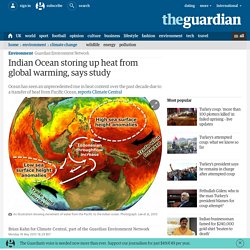
Scientists have zeroed in on the tropical Pacific as a major player in taking up that heat. But while it might have held that heat for a bit, new research shows that the Pacific has passed the potato to the Indian Ocean, which has seen an unprecedented rise in heat content over the past decade. The new work builds on a series of papers that have tracked the causes for what’s been dubbed the global warming slowdown, a period over the past 15 years that has seen surface temperatures rise slower than they did the previous decade. Shifts in Pacific tradewinds have helped sequester heat from the surface to the top 2,300 feet of the ocean.
But unlike Vegas, what happens in the Pacific doesn’t stay in the Pacific. You have to see these pictures of Seattle’s kayaking climate protesters. An estimated 500 climate activists took to kayaks, canoes, paddleboards, and even a solar-powered party barge on Saturday to tell Shell to get the hell out of Seattle.

Rallying cry: #sHellNo! The oil giant brought a huge drilling rig, the Polar Pioneer, to the city’s port on Thursday, over objections from the mayor, city council, and a whole lot of pissed-off Seattleites. Shell plans to use the port as a staging ground for oil drilling operations in the Arctic over the next two years. The kayaktivists made their objections clear — and made for a pretty spectacle against the blue-gray background of Puget Sound. 85% des Français ignorent la cause réelle de l’effet de serre, selon un baromètre ADEME. Peak oil, climate change and pipeline geopolitics driving Syria conflict. The civil war in Syria has been devastating, generating a death toll fast approaching 100,000, while uprooting millions of civilians from their homes.
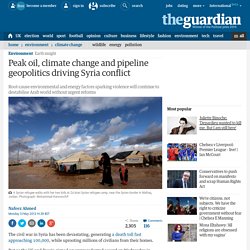
But as the US and Russia signed an unprecedented accord on Wednesday in search of a political solution to an increasingly intractable conflict, its underlying causes in a fatal convergence of energy, climate and economic factors remain little understood. The UN high commissioner for human rights has offered a conservative under-estimate of the death toll at about 70,000 people - accompanied by over 1 million Syrian refugees in neighbouring countries and more than 2 million people internally displaced.
Scientists weigh up new evidence on Antarctic ice melt - Climate News Network. The big picture of accelerating ice loss in Antarctica is becoming clearer.Image: euphro via Flickr Southern continent’s mysteries start to unfold as satellite data is used to measure the extent and pattern of increased ice loss that threatens to be a “runaway problem”.
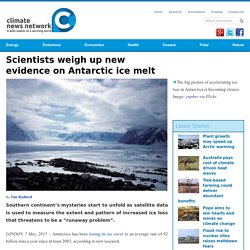
LONDON, 7 May, 2015 − Antarctica has been losing its ice cover at an average rate of 92 billion tons a year since at least 2003, according to new research. And while the scientists can’t yet say for certain that human-made climate change is the main cause, they warn that the ice loss has the potential to have serious impacts on sea level rise. The southern continent is the Earth’s largest store of fresh water, but is also its least studied area, having had no known human visitors until the late 18th century. So while scientists have a clear idea of processes at work in the Arctic, the big picture at the other end of the planet has been uncertain. Ouragans: un simulateur géant pour mieux prévoir leur puissance.
Western towns target coal companies over climate change. In a functioning democratic republic, a Congress elected to protect the interests of the people would redistribute some of the profits from fossil fuel companies to communities affected by climate change.
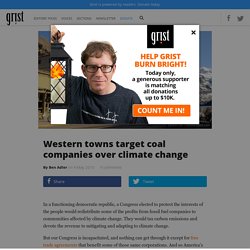
They would tax carbon emissions and devote the revenue to mitigating and adapting to climate change. But our Congress is incapacitated, and nothing can get through it except for free trade agreements that benefit some of those same corporations. Doctors are already seeing links between climate change and their patients’ health. It’s never a comfortable conversation, but it’s one that doctors like us have learned to deliver to our patients: Your behavior is endangering your health, and you need to recognize the risks.
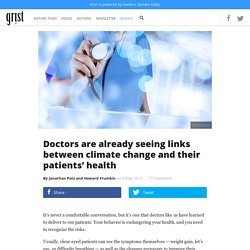
Usually, clear-eyed patients can see the symptoms themselves — weight gain, let’s say, or difficulty breathing — as well as the changes necessary to improve their health. Now, the nation’s leading medical practitioners — with the White House behind them — are stepping forward with a diagnosis that all of us should heed, because the symptoms are becoming undeniable and the risks tremendous: Climate change is a health threat.
The nation’s public health leaders, doctors, and nurses are seeing more and more evidence — both in their patients and in epidemiological data — showing the direct and indirect links. We’re seeing more respiratory illnesses, cardiovascular disease, and heat-related deaths. Climate change could drive 1-in-6 species to extinction. Cranking up the planetary heat is going to ratchet down the planet’s biodiversity, and new analysis suggests global warming could directly threaten 1-in-6 species with extinction if polluting practices continue unabated — up from about 3 percent today.
Scientists triggered alarm in 2004 when they warned in the journal Nature that climate change could drive 1 million varieties of plants and animals to extinction, but that was a rough estimate. In the decade since, researchers worldwide have been probing the dangers that could face individual species as climate change causes their ideal habitats to shift around them. Those studies are collectively revealing a strong relationship between the amount of climate pollution that human activity pumps into the atmosphere, and the number of extinctions it’s ultimately projected to cause.
KIT-2014-V13-web5. Demain, 10 000 emplois climatiques en Pays Basque nord - Bizi !